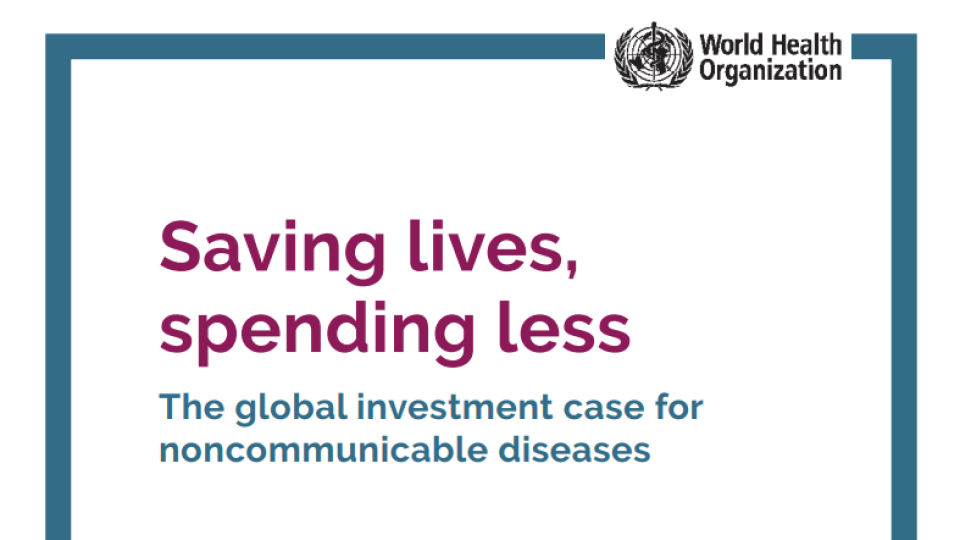New WHO report highlights urgency of NCD solutions — but overlooks the vital role of nurses and the health workforce

In advance of next week’s United Nations General Assembly (UNGA) High-Level Meeting on Noncommunicable Diseases (NCDs), the World Health Organization (WHO) today released an important new report, “Saving lives, spending less: the global investment case for noncommunicable diseases”. ICN welcomed the report’s urgent focus on preventive measures, but raised concerns about a significant gap: the lack of recognition of nurses and the health workforce as mission-critical to all of these action areas.
The report warns that progress on chronic health conditions, which are now responsible for the majority of global deaths and severely impact quality of life, has slowed in most regions. As it demonstrates, the economic and social case for investing in NCDs is strong. Spending just US$3 more per person per year could deliver a 4:1 return on investment and by 2030, save over 12 million lives, add 150 million healthy life years, and generate US$1 trillion in global economic gains. The WHO report sets out 29 “best buy” actions to prevent and address NCDs, including health taxes on tobacco and alcohol, scaling up cancer screenings and vaccinations, and managing chronic respiratory and cardiac conditions.
ICN President Dr José Luis Cobos Serrano said:
“The WHO NCD report exposes the scale of the challenge facing us and the necessity of urgently increasing investment in preventing and treating NCDS, which will both save millions of lives and bring a strong economic return.
‘However, the report entirely overlooks possibly the most central element of global NCD efforts: the health workforce. This is a grave oversight that risks making nurses and other health professionals at the heart of the solution to NCDs invisible. Our global efforts to combat NCDs cannot and should not sideline the vital and wide-ranging roles nurses and other health professionals play in helping people prevent and manage their conditions. The evidence shows that nurse-led primary health care transforms quality of life and health system cost effectiveness, and we have a massive opportunity to empower nurses, including through advanced and specialist roles, to tackle the growing NCD crisis this report so clearly indicates. This is the strong message ICN will take to the UNGA in New York next week.”
Nurses and other health professionals enable the highest attainable standard of health throughout life, from health promotion, education, and disease prevention to treatment, rehabilitation, and palliative care. The vital work of the world’s 30 million nurses is not confined to responding when things go wrong. As evident in ICN’s Primary Health Care report, nurses are at the centre of efforts to transform health systems from an illness focus to a focus on lifelong wellbeing through primary and preventive care. All around the world, nurses are leading NCD prevention and response by screening and managing chronic conditions; educating and empowering populations to decrease consumption of tobacco, alcohol, and unhealthy foods; and advancing immunization.
ICN CEO Howard Catton warned that undervaluing the huge economic and social impact of the health workforce undermines our global health ambitions. He commented:
“Nurses and other healthcare workers are a ‘best buy’ for global health and deliver substantial health and economic benefits and returns. This is an incontrovertible truth we should never be shy of repeating.
‘The omission of the health workforce as an NCD ‘best buy’ is a major oversight. Recent McKinsey’s research shows that closing the health workforce shortage gap would add $1.1 trillion to our world’s economy and avert a staggering 189 million years of life lost, messages backed up by ICN’s Economic Power of Care reports.
‘The fact is, without strengthening the health workforce, we simply will not be able to take the action so urgently needed on any of the areas the report highlights.
‘The ongoing failure to recognize and invest in nurses and health professionals has become a chronic condition in and of itself — and one that is debilitating our attempts to strengthen global health. At this year’s World Health Assembly, countries not only extended the Strategic Directions for Nursing and Midwifery but called to accelerate progress. ICN will take this momentum forward into the UNGA NCD meetings we are attending next week, calling for leaders to finally prioritize the workforce that underpins all of our NCD reduction targets and other health goals.”